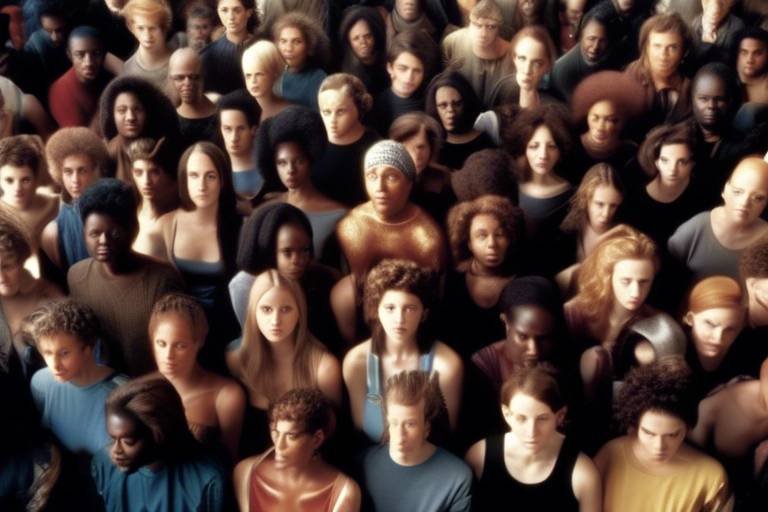Is There a Difference Between Mind and Consciousness?
When we dive into the depths of our own thoughts and experiences, we often stumble upon two terms that seem to dance around each other: mind and consciousness. At first glance, they might appear to be synonymous, but as we peel back the layers, we discover that they represent distinct yet interconnected aspects of our existence. The mind can be thought of as the grand library of our thoughts, memories, and emotions, while consciousness is akin to the light illuminating that library, allowing us to perceive and interact with the world around us. But what exactly sets them apart? Let’s embark on this enlightening journey to unravel the mysteries behind these two profound concepts.
The mind encompasses a vast array of functions including thought processes, reasoning, and emotional responses. It serves as the engine room of our cognitive abilities, shaping our behaviors and influencing our decisions. The mind is often viewed through various lenses—philosophical, psychological, and neuroscientific—which all contribute to our understanding of its role in human experience. On the other hand, consciousness refers to the state of being aware of and able to think about one’s own existence, sensations, thoughts, and surroundings. It is the subjective experience of being alive and aware, a phenomenon that has puzzled thinkers for centuries.
To illustrate the distinction, consider this analogy: if the mind is a complex computer system, consciousness is the user interface that allows us to interact with that system. The mind processes data, stores information, and executes commands, while consciousness is what allows us to be aware of those processes and make sense of them. This relationship raises intriguing questions: Can we have thoughts without being conscious of them? Or is consciousness itself a product of the mind’s intricate workings?
Philosophers and scientists alike have debated these questions for ages. Some argue that consciousness arises from the mind’s operations, while others propose that it exists independently, influencing the mind's processes. This brings us to the heart of the mind-body problem, which seeks to understand how our mental states—thoughts, feelings, and perceptions—interact with our physical bodies. This debate is not just academic; it has real implications for how we view ourselves and our place in the universe.
In summary, while mind and consciousness are deeply intertwined, they are not the same. The mind can function without conscious awareness, yet consciousness relies on the mind to interpret and navigate our experiences. As we continue to explore these concepts, we may find that understanding the nuances between mind and consciousness not only enriches our knowledge but also enhances our appreciation of the human experience.
- What is the main difference between mind and consciousness?
The mind refers to the collection of cognitive processes, while consciousness is the awareness of those processes. - Can we be conscious without using our minds?
Generally, consciousness involves the mind; however, some argue that there could be forms of awareness that do not require active thought. - How do scientists study consciousness?
Scientists use various methods, including neuroimaging and behavioral studies, to understand how consciousness arises from brain activity. - Is consciousness the same as self-awareness?
Not quite. While self-awareness is a form of consciousness, consciousness itself can exist without self-reflection.

Defining Mind
Understanding the concept of the mind is like trying to catch smoke with your bare hands; it’s elusive, complex, and often challenging to pin down. The mind is not merely a collection of thoughts and feelings; it encompasses a vast arena of cognitive processes that govern our behavior, decision-making, and interactions with the world around us. So, what exactly is the mind? In essence, it can be defined as the set of cognitive faculties that enables consciousness, perception, thinking, judgment, and memory. It is the arena where our thoughts dance, our emotions swirl, and our memories reside.
To dive deeper into the mind, we can explore its various functions and structures. The mind can be thought of as an intricate system that integrates different mental processes, including:
- Perception: How we interpret sensory information.
- Memory: The storage and retrieval of information.
- Emotion: The feelings that influence our decisions.
- Reasoning: The ability to think logically and solve problems.
These functions work together like a well-oiled machine, allowing us to navigate our daily lives. But the mind doesn’t operate in isolation; it interacts closely with our brain and body, creating a complex interplay that shapes our experiences and actions. This relationship is central to understanding the mind's role in human cognition and behavior. Various theories have emerged to explain these interactions, each offering unique insights into how we perceive ourselves and the world.
One way to categorize theories of the mind is by examining how they approach the relationship between mental states and physical processes. For instance, some theories, like dualism, argue that the mind and body are distinct entities, while others, such as physicalism, assert that all mental states are fundamentally physical. This ongoing debate raises profound questions about the nature of reality and our place within it.
Moreover, the mind is often described in terms of its conscious and unconscious components. The conscious mind is what we are aware of at any given moment—our thoughts, feelings, and perceptions. The unconscious mind, on the other hand, houses memories and processes that we are not actively aware of but that influence our behavior and decisions. This distinction is crucial for understanding how we operate on a day-to-day basis and how our past experiences shape our present selves.
In summary, defining the mind is a multifaceted endeavor that requires an exploration of its functions, structures, and the various theories that attempt to explain its role in human cognition and behavior. As we continue to unravel the mysteries of the mind, we gain valuable insights into our own nature and the essence of what it means to be human.

Understanding Consciousness
When we dive into the deep waters of consciousness, it’s like embarking on a journey through the very essence of what it means to be human. At its core, consciousness is our awareness of ourselves and our surroundings. It’s that internal dialogue we have, the thoughts that race through our minds, and the feelings that color our experiences. But what exactly does it mean to be conscious? And how does it differ from simply having a mind?
To unravel this mystery, we can categorize consciousness into various types. These categories help us understand the different layers of awareness we experience in our daily lives. Here are a few primary types:
- Primary Consciousness: This is the basic level of awareness, where we perceive sensory inputs and have simple, immediate experiences. Think of it as the raw data of our existence—like feeling the warmth of the sun on your skin.
- Reflective Consciousness: This is a step up, where we not only experience but also reflect on those experiences. It’s like being able to step back and think, “Wow, that was a great meal!”
- Self-Consciousness: Here, we become aware of ourselves as separate entities. We think about our thoughts and feelings, often leading to introspection and self-evaluation. It’s that moment when you realize you’re not just living life; you’re observing your own life unfold.
The debates surrounding consciousness are as complex as the phenomenon itself. Some argue that consciousness is a product of brain activity, while others believe it transcends mere biological processes. This leads us to fascinating questions: Is consciousness merely a byproduct of neural networks firing in our brains, or is it something more profound? Can machines ever achieve consciousness, or is it an inherently human trait?
Philosophers and scientists alike have pondered these questions for centuries, and while we may not have all the answers, the exploration of consciousness continues to be a captivating field. Neuroscience, for instance, has made significant strides in understanding how different brain regions contribute to our conscious experience. For example, studies have shown that the prefrontal cortex plays a crucial role in decision-making and self-reflection, while the thalamus acts as a relay station for sensory information, influencing our awareness of the world around us.
As we dig deeper into the layers of consciousness, we also encounter the concept of altered states of consciousness. These can be induced by various factors, including meditation, sleep, and even psychoactive substances. Each of these states offers a unique glimpse into the workings of our mind, challenging our understanding of what it means to be conscious. They remind us that consciousness is not a fixed state but a dynamic and fluid experience that can shift and change.
Ultimately, understanding consciousness is not just an academic exercise; it’s a journey into the very heart of our existence. It shapes our perceptions, influences our decisions, and defines our reality. So, the next time you find yourself lost in thought or marveling at a sunset, take a moment to appreciate the intricate tapestry of consciousness that allows you to experience life in all its richness.
Q: What is the difference between mind and consciousness?
A: The mind refers to the collection of cognitive processes, including thoughts, emotions, and memories, while consciousness is the awareness of those processes and experiences.
Q: Can animals be conscious?
A: Many scientists believe that certain animals possess forms of consciousness, as they demonstrate awareness and the ability to experience emotions.
Q: How does consciousness relate to the brain?
A: Consciousness is closely linked to brain activity, with various regions of the brain contributing to different aspects of awareness and perception.

Theories of Mind
The exploration of the mind has captivated philosophers, psychologists, and neuroscientists for centuries. It’s like trying to unravel a complex tapestry, each thread representing a different theory that attempts to explain the intricate relationship between our mental processes and our physical existence. At the heart of this discussion are various theories of mind, each offering a unique lens through which we can understand our thoughts, emotions, and behaviors. From dualism to functionalism, these theories not only provide insights into the nature of the mind but also challenge our perceptions of reality and existence.
One of the most prominent theories is dualism, famously championed by René Descartes. Dualism posits that the mind and body are fundamentally distinct entities. Imagine your mind as a pilot navigating a complex aircraft; the body is the machine that carries out the pilot's commands. This separation raises intriguing questions: If the mind is non-physical, how does it interact with the physical body? This interaction problem has left many scratching their heads, pondering the very essence of consciousness and existence.
On the flip side, we have physicalism, which argues for a more unified perspective. According to physicalism, everything about the mind can be explained through physical processes and brain activity. Think of it as a computer program; the software (mind) is entirely dependent on the hardware (brain). This theory suggests that understanding the brain's biology can unlock the secrets of consciousness, leading to a more scientifically grounded understanding of mental states.
Another compelling theory is functionalism. This perspective shifts the focus from the internal composition of mental states to their functional roles. In simpler terms, functionalists argue that what matters is not what the mind is made of, but what it does. For example, if we consider pain, it doesn’t matter if it’s caused by a stubbed toe or a broken heart; what matters is the experience and the response it triggers. This theory broadens our understanding of mental processes, suggesting that various systems—biological, artificial, or otherwise—could potentially exhibit consciousness if they perform similar functions.
To summarize the key theories of mind, let’s take a look at the following table:
| Theory | Overview | Key Proponent |
|---|---|---|
| Dualism | Mind and body are distinct entities. | René Descartes |
| Physicalism | Everything about the mind can be explained through physical processes. | Various (scientific community) |
| Functionalism | Mental states are defined by their functional roles. | Hilary Putnam, Jerry Fodor |
These theories not only provide a framework for understanding the mind but also invite us to ponder profound questions about our existence. What does it mean to be conscious? How do our thoughts influence our actions? As we delve deeper into these theories, we begin to see the intricate dance between mind and consciousness, shaping our reality in ways we are only beginning to comprehend.
- What is the main difference between mind and consciousness?
Mind refers to the set of cognitive faculties that enables consciousness, perception, thinking, judgment, and memory, while consciousness is the state of being aware of and able to think about one's own existence, thoughts, and surroundings. - Can the mind exist without consciousness?
This is a debated topic. Some argue that mental processes can occur without conscious awareness, while others believe that consciousness is integral to the mind's functioning. - What role does neuroscience play in understanding the mind?
Neuroscience investigates the biological basis of mental processes, helping to bridge the gap between physical brain activity and conscious experience.

Dualism vs. Physicalism
When diving into the philosophical debate surrounding the nature of the mind and consciousness, two prominent theories often emerge: dualism and physicalism. These theories offer contrasting views on how we understand the relationship between our mental states and the physical world. Dualism, famously championed by René Descartes, posits that the mind and body are fundamentally different substances. According to this perspective, the mind is non-physical and exists separately from the brain and body, which are physical entities. This creates a fascinating, albeit complex, framework where mental phenomena cannot be entirely explained by physical processes.
On the other hand, physicalism argues for a more unified approach, suggesting that everything about the mind can be understood through physical processes. In this view, mental states are not separate from the brain; rather, they are emergent properties of physical interactions within the brain. This perspective aligns closely with advancements in neuroscience, where researchers continually uncover how brain activity correlates with thoughts, emotions, and consciousness itself. Physicalism challenges the notion of a separate mind, proposing instead that our thoughts and feelings are intrinsically linked to our biological makeup.
To better illustrate the differences between these two schools of thought, consider the following table:
| Theory | Key Characteristics |
|---|---|
| Dualism |
|
| Physicalism |
|
Both theories raise intriguing questions about the nature of our existence. For instance, if dualism is correct, what does that mean for our understanding of consciousness? Does it imply that there is something beyond the physical realm? Conversely, if physicalism holds true, does that diminish the significance of our subjective experiences? These questions not only challenge our understanding of the mind but also our perceptions of free will, identity, and reality itself.
In conclusion, the debate between dualism and physicalism is not just an academic exercise; it has profound implications for how we view ourselves and our place in the universe. As we continue to explore these concepts, we may find that understanding the mind and consciousness is one of the most complex and rewarding journeys in human thought.
- What is dualism? Dualism is the belief that the mind and body are separate entities, each with distinct properties and functions.
- What is physicalism? Physicalism asserts that everything about the mind can be explained through physical processes and that mental states are not separate from the brain.
- How do these theories impact our understanding of consciousness? They shape our views on whether consciousness is a separate, non-physical phenomenon or an emergent property of physical brain activity.
- Can both theories coexist? Some philosophers propose a middle ground, suggesting that while mental states arise from physical processes, they may still possess unique properties deserving of separate consideration.

Functionalism
Functionalism is a fascinating perspective in the study of the mind, proposing that mental states are defined by their roles and functions rather than by their internal composition. Imagine a computer: it doesn't matter what the hardware is; what counts is how it processes information and performs tasks. Similarly, functionalism emphasizes that the essence of mental states lies in their relationships and interactions within a system, rather than the specific material that constitutes them.
This theory suggests that mental states can be understood by examining how they relate to inputs (stimuli from the environment), outputs (behavioral responses), and other mental states. For instance, consider the experience of feeling happy. According to functionalism, what matters is not the specific neurochemical processes happening in the brain but rather how that feeling influences behavior (like smiling or socializing) and how it interacts with other mental states (like memories or thoughts about the future).
One of the compelling aspects of functionalism is its ability to bridge the gap between the physical and the mental. It allows for a more inclusive understanding of consciousness, acknowledging that mental processes can be realized in various forms, whether biological, artificial, or even theoretical. This perspective opens up intriguing discussions about artificial intelligence and whether machines could ever possess a form of consciousness if they replicate the functional roles of human mental states.
To illustrate the functionalist view, let's consider a simple example:
| Mental State | Input | Output |
|---|---|---|
| Feeling Sad | Loss of a loved one | Crying, withdrawal from social activities |
| Feeling Happy | Receiving good news | Smiling, celebrating with friends |
This table demonstrates how different mental states can be understood through their inputs and outputs, aligning with the functionalist approach. By focusing on the roles these states play, we gain insight into the complexity of human experience without getting bogged down by the specific biological details.
Critics of functionalism argue that it overlooks the subjective nature of consciousness, often referred to as "qualia." They contend that understanding the function of mental states does not capture the rich, personal experience of what it feels like to be conscious. However, functionalists counter that the emphasis on functions can still provide a robust framework for understanding how consciousness operates in practice.
In summary, functionalism offers a unique lens through which we can explore the mind and consciousness. By focusing on the roles mental states play within a system, it allows us to consider the broader implications of consciousness in both humans and machines, keeping the conversation alive about what it truly means to be aware.

Types of Consciousness
When we dive into the fascinating world of consciousness, it's like exploring a vast ocean with various depths and currents. Consciousness isn't just a singular entity; it can be categorized into different types that reflect our experiences and awareness. At the core, we can identify three primary types of consciousness: primary consciousness, reflective consciousness, and self-consciousness. Each of these plays a unique role in shaping our cognitive experiences and self-awareness.
Primary consciousness refers to the basic awareness of sensory experiences and immediate perceptions. Imagine standing on a beach, feeling the cool breeze on your skin, hearing the waves crash against the shore, and seeing the vibrant colors of the sunset. This type of consciousness allows us to experience the world directly and respond to it in real-time. It's instinctual and immediate, a bit like the first splash of cold water when you dive into a pool—refreshing and undeniably present.
On the other hand, reflective consciousness takes us a step further. It’s where we start to think about our thoughts. This type of consciousness enables us to analyze and reflect on our experiences. For instance, after that beach day, you might ponder why you felt so relaxed or what the colors of the sunset reminded you of. Reflective consciousness allows us to engage in deeper thinking, making sense of our emotions and experiences. It's akin to looking at a photograph of that sunset later and recalling not just the beauty, but the feelings it evoked.
Lastly, we have self-consciousness, which is a more complex form of awareness. This is where we become aware of ourselves as separate entities. It’s the consciousness that makes us think, “I exist, I have thoughts, and I can influence my surroundings.” This type of consciousness often brings with it an awareness of how others perceive us, leading to feelings of pride, embarrassment, or even social anxiety. Think of it as standing in front of a mirror—not just seeing your reflection, but also considering how you present yourself to the world.
To summarize, here’s a quick table that highlights the key differences among these types of consciousness:
| Type of Consciousness | Description | Example |
|---|---|---|
| Primary Consciousness | Immediate awareness of sensory experiences | Feeling the warmth of the sun on your skin |
| Reflective Consciousness | Thinking about one's thoughts and experiences | Contemplating the meaning of a sunset |
| Self-Consciousness | Aware of oneself as an individual | Feeling nervous before speaking in public |
Understanding these types of consciousness is crucial as they shape not only our thoughts but also our behaviors and interactions with the world around us. They form the foundation of our mental experiences, influencing how we perceive reality and ourselves. Each type plays a distinct role, and together, they create the rich tapestry of human experience.
- What is the difference between consciousness and awareness? Consciousness refers to the overall state of being aware, while awareness is the specific recognition of particular stimuli or experiences.
- Can consciousness exist without the mind? Philosophically, this is debated; many argue that consciousness is a function of the mind, while others propose that consciousness may exist independently in some form.
- How do different types of consciousness affect our daily lives? Each type influences how we interact with the world, make decisions, and understand our emotions, ultimately shaping our personal experiences and relationships.

Mind-Body Problem
The is one of the most intriguing and perplexing dilemmas in philosophy and science. At its core, it grapples with the relationship between our mental states—thoughts, feelings, and consciousness—and the physical processes of the brain and body. Imagine trying to untangle a ball of yarn; the more you pull, the more complicated it seems. This is akin to the challenge we face when attempting to understand how our minds interact with our bodies.
Philosophers have pondered this question for centuries, often asking: How can something as intangible as thought arise from something as concrete as brain activity? To illustrate this, consider the analogy of a computer. The hardware (the computer itself) is necessary for the software (the programs and applications) to function, yet the two are distinct entities. Similarly, our minds and bodies may operate in tandem but remain fundamentally different in nature.
There are several key perspectives on the mind-body problem, each offering its own insights:
- Dualism: This theory posits that the mind and body are separate entities. René Descartes, a prominent dualist, argued that the mind is a non-physical substance that interacts with the physical body, much like a puppet master controls a puppet.
- Physicalism: In contrast, physicalism asserts that everything about the mind can be explained in terms of physical processes. According to this view, mental states are nothing more than brain states, and understanding the brain will ultimately unlock the mysteries of consciousness.
- Functionalism: This perspective suggests that mental states are defined by their functional roles rather than their internal composition. In other words, it’s not about what the mind is made of, but what it does that matters.
As we delve deeper into the mind-body problem, we must also consider the implications it has on our understanding of consciousness. For instance, if consciousness is merely a byproduct of brain activity, what does that mean for our sense of self? Are we simply biological machines, or is there something more profound at play?
Neuroscientific research has provided fascinating insights into this dilemma. Studies using advanced imaging techniques have shown that specific brain areas light up during various mental tasks, suggesting a correlation between brain activity and mental states. However, correlation does not imply causation. Just because we can observe brain activity does not mean we fully understand how it translates into thoughts and experiences.
Moreover, the mind-body problem raises significant philosophical questions about free will and personal identity. If our thoughts and decisions are merely the result of physical processes, can we truly claim to be the authors of our actions? This leads to a cascade of existential questions that challenge our understanding of what it means to be human.
In conclusion, the mind-body problem is a complex interplay of philosophy, neuroscience, and psychology. As we continue to explore this fascinating topic, it invites us to reflect on our own experiences of consciousness and the nature of our existence. Just like peeling an onion, each layer we uncover reveals more depth and complexity, urging us to keep questioning and seeking answers.
- What is the mind-body problem? The mind-body problem explores the relationship between mental states and physical processes, questioning how consciousness arises from brain activity.
- What are the main theories regarding the mind-body relationship? The primary theories include dualism, physicalism, and functionalism, each offering a unique perspective on how the mind and body interact.
- How does neuroscience contribute to understanding the mind-body problem? Neuroscience provides insights into the biological underpinnings of mental states, revealing correlations between brain activity and consciousness.
- What implications does the mind-body problem have for free will? The mind-body problem raises questions about whether our thoughts and actions are genuinely our own or simply the result of physical processes.

Neuroscientific Perspectives
When we delve into the realm of neuroscience, we are essentially peering into the intricate machinery that fuels the mind and consciousness. Neuroscience, the scientific study of the nervous system, provides profound insights into how our brains operate, correlating brain activity with mental states and conscious experiences. Imagine your brain as a complex orchestra, where each neuron plays its unique instrument, contributing to the symphony of your thoughts, feelings, and perceptions. This orchestra, with its harmonious connections and interactions, is what gives rise to our conscious experience.
One of the most fascinating aspects of neuroscience is its ability to map the brain's activities during various cognitive tasks. Advanced imaging techniques, such as functional magnetic resonance imaging (fMRI) and electroencephalography (EEG), allow scientists to observe which areas of the brain are activated when we think, feel, or perceive the world around us. For instance, when you engage in a complex mathematical problem, specific regions in your brain light up, indicating that those areas are actively involved in the process. This leads to a crucial question: if our thoughts and experiences are tied to specific brain activities, what does this imply about the nature of consciousness itself?
Furthermore, research has shown that consciousness is not a singular state but rather a spectrum of experiences. Neuroscientists categorize these experiences into different levels of consciousness, ranging from basic awareness of our surroundings to higher-order reflective consciousness, where we ponder our thoughts and feelings. This categorization helps clarify how various mental states can emerge from neural processes. For example, the default mode network is a network of brain regions that is active during rest and self-referential thought, illustrating how our minds wander and reflect when we are not focused on external tasks.
To further illustrate the relationship between brain activity and consciousness, consider the following table that outlines some key findings from neuroscientific research:
| Brain Activity | Associated Mental State |
|---|---|
| Increased activity in the prefrontal cortex | Decision-making and problem-solving |
| Activation of the amygdala | Emotional responses, particularly fear |
| Engagement of the parietal lobe | Spatial awareness and navigation |
| Default mode network activity | Daydreaming and self-reflection |
This table highlights how different brain regions correspond to various mental states, reinforcing the idea that our consciousness is deeply intertwined with the physiological workings of our brains. However, this leads us to a philosophical conundrum: if consciousness arises from brain activity, does that mean our thoughts and experiences are merely byproducts of neural processes? Or is there something more profound at play?
In conclusion, the neuroscientific perspective offers invaluable insights into the relationship between mind and consciousness. It not only helps us understand how our brains function but also raises significant questions about the essence of our experiences. As we continue to explore these connections, we may come closer to unraveling the mysteries of what it truly means to be conscious.
- What is the difference between mind and consciousness?
The mind encompasses all cognitive activities, including thoughts, emotions, and memories, while consciousness refers specifically to our awareness of those experiences. - Can consciousness exist without the brain?
This is a debated topic; most neuroscientific evidence suggests that consciousness is closely linked to brain function. - How do neuroscientists study consciousness?
Neuroscientists use imaging techniques like fMRI and EEG to observe brain activity associated with different conscious states.

Philosophical Implications
The exploration of the mind and consciousness is not merely an academic exercise; it has profound that challenge our understanding of existence, identity, and free will. When we delve into the relationship between the mind and body, we encounter questions that have puzzled thinkers for centuries. For instance, if consciousness arises solely from physical processes in the brain, what does that mean for our notion of free will? Are our decisions truly our own, or are they merely the result of biochemical reactions? These queries not only provoke thought but also lead to a re-evaluation of how we perceive our own agency.
Moreover, the mind-body problem raises significant questions about personal identity. If our thoughts and experiences are products of brain activity, what happens when our brain undergoes changes, such as in cases of trauma or neurodegenerative diseases? Do we remain the same person, or does our identity shift as our mental states evolve? This dilemma invites us to consider the essence of who we are, challenging the very fabric of our self-conception.
In addition, the philosophical implications extend to our understanding of reality itself. If consciousness shapes our perception of the world, how can we be sure that our experiences reflect an objective reality? This leads to the intriguing debate between idealism and realism, where idealists argue that reality is mentally constructed, while realists contend that an external world exists independent of our perceptions. Such discussions are not just theoretical; they influence how we interact with one another and the world around us.
To further illustrate these points, consider the following table that summarizes key philosophical perspectives on the mind-body relationship:
| Philosophical Perspective | Key Idea |
|---|---|
| Dualism | Mind and body are separate entities; mental phenomena are non-physical. |
| Physicalism | Everything is physical; mental states are brain states. |
| Functionalism | Mental states are defined by their functional roles rather than their internal composition. |
| Idealism | Reality is mentally constructed; the mind shapes our experiences. |
| Realism | An objective world exists independently of our perceptions. |
These philosophical discussions are not just academic; they resonate with our daily lives. How we approach challenges, make decisions, and understand our relationships can all be influenced by our beliefs about the mind and consciousness. As we continue to explore these profound concepts, we may find that the answers we seek are not just about understanding ourselves, but about finding our place in a larger, interconnected universe.
- What is the mind? The mind refers to the set of cognitive faculties that enables consciousness, perception, thinking, judgment, and memory.
- What is consciousness? Consciousness is the state of being aware of and able to think about one's own existence, thoughts, and surroundings.
- What is the mind-body problem? The mind-body problem is a philosophical question regarding the relationship between mental states and physical processes in the body.
- How do different philosophical theories view the mind and consciousness? Different theories, such as dualism, physicalism, and functionalism, offer varied perspectives on the nature of the mind and its connection to the body.
- What implications do these theories have for free will? The implications vary; some theories suggest that if our thoughts are purely physical, our sense of free will may be an illusion.
Frequently Asked Questions
- What is the difference between mind and consciousness?
The mind refers to the collection of cognitive faculties that includes thinking, reasoning, and emotions, while consciousness is the state of being aware of and able to think about one's own existence, thoughts, and surroundings. In simpler terms, the mind is like a vast library of thoughts and feelings, whereas consciousness is the light that shines on those books, allowing us to read and understand them.
- How do theories of mind explain mental processes?
Theories of mind, such as dualism and physicalism, provide different frameworks for understanding how mental processes occur. Dualism suggests that the mind and body are separate entities, while physicalism argues that everything about the mind can be explained through physical processes in the brain. Think of it like a computer: dualism sees the hardware and software as distinct, while physicalism views them as interconnected and dependent on each other.
- What are the types of consciousness?
Consciousness can be categorized into various types, including primary consciousness, which is basic awareness of the environment; reflective consciousness, which allows for deeper thinking and self-reflection; and self-consciousness, where one becomes aware of their own identity and existence. Each type plays a unique role in how we experience life and interact with the world around us.
- What is the mind-body problem?
The mind-body problem addresses the relationship between mental states and physical processes. It raises questions about how consciousness arises from brain activity and what this means for our understanding of human experience. Imagine trying to figure out how a song (the mind) can be played through a speaker (the body) — it's all about understanding the connection between the two.
- How does neuroscience contribute to our understanding of mind and consciousness?
Neuroscience sheds light on the biological foundations of the mind and consciousness by examining how brain activity correlates with mental states. Through techniques like brain imaging, scientists can observe which areas of the brain are active during different thoughts or feelings, helping to bridge the gap between the physical and mental realms.
- What are the philosophical implications of the mind-body relationship?
The philosophical implications of the mind-body relationship delve into questions about free will, personal identity, and the nature of reality. It invites us to explore how our understanding of the mind affects our views on morality, existence, and what it means to be human. It's like pondering the ultimate question of whether we are the authors of our own stories or merely characters in a larger narrative.


















